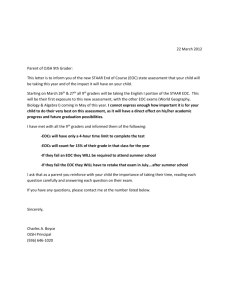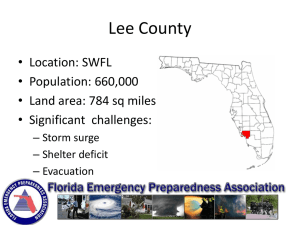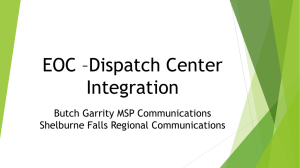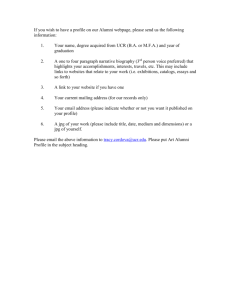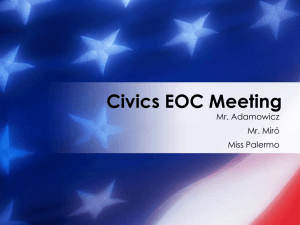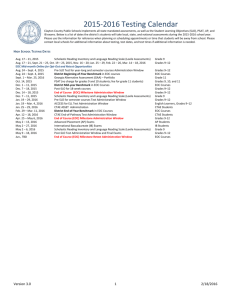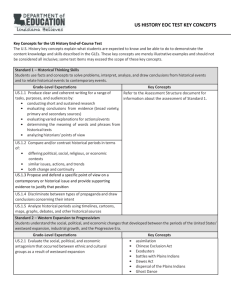EMPG Forms
advertisement
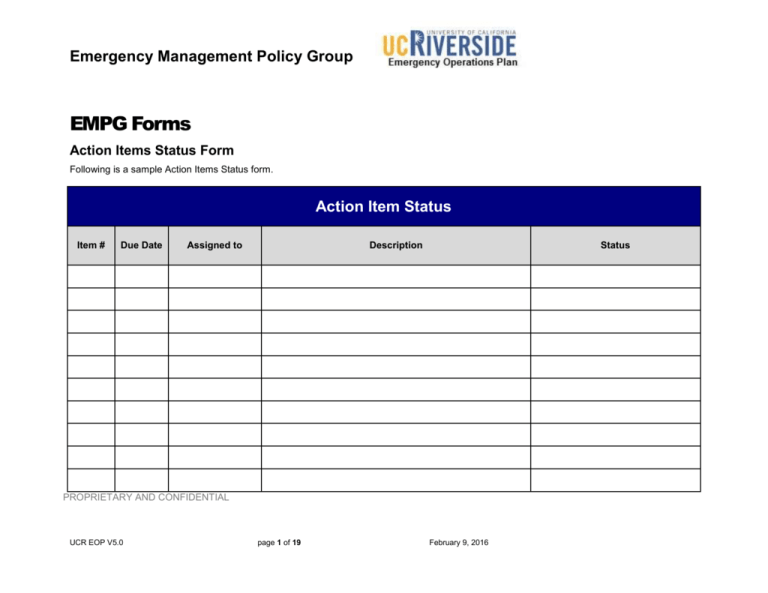
Emergency Management Policy Group EMPG Forms Action Items Status Form Following is a sample Action Items Status form. Action Item Status Item # Due Date Assigned to Description Status 1. 2. 3. 4. 5. 6. 7. 8. 9. 10. PROPRIETARY AND CONFIDENTIAL UCR EOP V5.0 page 1 of 19 February 9, 2016 Emergency Management Policy Group Strategic Issues Tracking Form Following is a sample Strategic Issues Tracking form which is used to document and prioritize issues for future decision making. Strategic Issues Tracking Issue # Priority Status (schedule for deliberation, or assigned) Issue Description 1. 2. 3. 4. 5. 6. 7. 8. 9. PROPRIETARY AND CONFIDENTIAL Priorities: A----Deliberate/Schedule within 24 hours B----Deliberate/Schedule within 1-4 days C----Deliberate/Schedule within next 1 week UCR EOP V5.0 page 2 of 19 February 9, 2016 Emergency Management Policy Group Impact and Consequence Forecast Form Following is the Impact and Consequences Forecast form to be used by the EMPG to define and document the “worst probable” planning case. IMPACT AND CONSEQUENCE FORECAST (Page 1 of 2) Affected Location: Issue / Event Description: Date / Time (current as of): Document Managed By (Name / Phone / Email): Estimated Duration of Situation: Fatalities: Injuries (number and types): Missing/Known Status: Description of Likely UC Riverside Impacts: Description of Likely Community/External Impacts: PROPRIETARY AND CONFIDENTIAL UCR EOP V5.0 page 3 of 19 February 9, 2016 Emergency Management Policy Group Additional Impacts (Page 2 of 2) Description of Departmental Outcome (Assumptions to Include: Scale, Scope, Nature) HUMAN IMPACT SAFETY / ENVIRONMENT / SECURITY CRISIS COMMUNICATIONS / REPUTATIONAL RISKS CAMPUS OPERATIONS FINANCIAL/FUNDING LEGAL GOVERNMENT/REGULATORY AFFAIRS UCR EOP V5.0 page 4 of 19 February 9, 2016 Emergency Management Policy Group Sample Meeting Agendas The following sample agenda can be used for the initial EMPG meeting. EMPG —INITIAL MEETING AGENDA Establish expected duration of meeting Confirm record keeping process Conduct incident briefing From EOC if activated From EMPG members providing perspective / update from their area of responsibility Define the EMPG role Review crisis management requirements and needs Identify needs for ad-hoc EMPG members or additional resources Identify and deliberate on any strategic issues related to management of the crisis and its potential impact on the campus Document outstanding issues (use the Strategic Issues Tracking form *) that cannot be immediately resolved Prioritize those items that require more timely resolution Define and confirm the communications strategy & approve initial public statement Document any identified action items (use the Action Items Status form **) Administrative Determine any extended response requirements (off hours) Review adequacy of EMPG staff support, resources Set next two meeting times and outline the schedule (24-48 hours) *Strategic Issues Tracking: The goal is to identify as many issues as possible that may need to be addressed for eventual deliberation by the EMPG. Select issues should be scheduled for each / future EMPG meeting. **Action Items Status: The purpose is to capture any specific action items assigned or identified during the meeting. Status and/or resolution should be reviewed in future meetings. UCR EOP V5.0 page 5 of 19 February 9, 2016 Emergency Management Policy Group The following sample agenda can be used for the ongoing EMPG meetings and may be customized and adjusted as necessary. EMPG—ONGOING MEETING AGENDA Establish expected duration of meeting Receive incident update briefing From EOC if activated Discuss status updates from EMPG members Review progress on actions or strategy development assignments Review potential impact and consequences of the event or issue (use the Impact Consequence Forecast form*) and Discuss potential consequences of the incident or issue Deliberate and made decisions on select strategic issues related to management of the crisis and its potential impact Document decisions and appropriate next steps Identify additional strategy issues Document and prioritize those items that require more timely resolution (use the Strategic Issues Tracking form *) Define and confirm the communications strategy & approve public statement(s) Document any identified action items (use the Action Items Status form **) Administrative Determine any extended response requirements (off hours) Review adequacy of MRT staff support, resources Set next two meeting times and outline the schedule (24-48 hours) UCR EOP V5.0 page 6 of 19 February 9, 2016 Emergency Management Policy Group Post Incident Review POST INCIDENT REVIEW: DISCUSSION POINTS Was the notification process effective? Was there enough time to take action? Was the activation of the team timely and effective? Were we able to implement existing plans and procedures? Were they effective? Are adjustments needed? Did we coordinate effectively? Internally? With the UCOP’s screening group? Or UCOP’s MRT if activated? With the EOC? With external agencies/groups, if involved? With affected customers? During the incident, did we define any new best practices? How has perception of UC Riverside changed as a result of the response? Internally? Externally? What were the lessons learned? What improvements were identified? How can they be incorporated into the plan? What is the implementation timeframe? UCR EOP V5.0 page 7 of 19 February 9, 2016 Emergency Management Policy Group Appendix C: Definition of Terms UC Location - the Campus, Medical Center or Laboratory where an event or incident is taking place. For the purpose of this plan, this term is being used. However during an actual response the actual name of the campus, medical center or laboratory location will be used. Scene - the on-scene or field location of a physical event, where the incident response occurs. This could be in a building or facility. Not every event for which this plan will be deployed will be of a physical nature or have a scene. EOC - the Emergency Operations Center (or Incident Command Center) where the emergency management team for that UC Location meets to coordinate its response, and to coordinate the incidentcommand based response aspects. ERT or Emergency Management & Response Structure – the structure and teams that coordinate and manage the overall campus, medical center or laboratory response and those teams that are Incident-Command based to meet each UC Location’s requirements. Incident Command Post (ICP) - the Incident Command Post is the location at the scene of a physical event where the UC response is directed from and where the Incident Commander is typically located. Crisis – any unexpected event or series of events that has the potential to, or does presently, significantly impact and/or harm to the University of California’s students, faculty, staff, local community, operations, buildings, assets, finances, image, reputation, or the environment. The actual or potential crisis results from both the event itself and the impacts and consequences that result. UCR EOP V5.0 page 8 of 19 February 9, 2016 Emergency Management Policy Group Appendix A: Checklists: EMPG Members UCR EOP V5.0 page 9 of 19 February 9, 2016 Emergency Management Policy Group Emergency Management Policy Group (EMPG) Chancellor – Emergency Action Checklist Core Activities During EMPG Activations: Event / Incident Name : Support EOC Manager Set strategic direction and priorities, and support campus emergency response and recovery efforts. Determine campus closures, program cancellations, and resumptions Declare Campus State of Emergency (if required.) REMINDER: Do not talk with Press/Media. Direct all Press and Media inquiries to the UCR Public Information Officer (PIO) Name : Date / Time: Initial Actions Report with fellow EMPG Executive Committee members to the primary meeting location, Chancellor’s Conference Room, 4217 Hinderaker Hall (if available) or an alternate identified location as directed by the Emergency Operations Center (EOC). Receive initial status report provided by the Emergency Operations Center (EOC) Manager from the EMPG Liaison officer (VC FBO or other) or EOC Liaison. Select an EMPG Liaison officer if the VC FBO is unavailable. Based upon the current situation status report, determine the need for remaining the EMPG members, or selected EMPG members, to respond to campus Lead the EMPG Executive Committee in support of EOC response, recovery, and continuity of operations. Provide strategic direction and policy guidance to EOC. Assign action items to EMPG members to facilitate restoration and recovery, if necessary. Establish a schedule for EOC Briefings, and EMPG Executive Committee / EMPG group gatherings, Determine topics and desired outcomes needed for medium and long term restoration and recovery planning. Declare a Campus State of Emergency (if required. See Appendix A for additional details on Campus State of Emergency). Do not report to the EOC unless requested. (Avoid concentration of, and potential conflict of, authority.) Making a Declaration of Emergency: Consult with UC President (if possible, not required). Fill out and sign the Proclamation of a Campus State of Emergency form (Appendix B). Forward completed and signed form to EOC Liaison for distribution. Inform the EMPG (if not already accomplished). Issue a written proclamation ending the Campus State of Emergency as soon as appropriate. (over) UCR EOP V5.0 page 10 of 19 February 9, 2016 Emergency Management Policy Group Order of Succession to the Chancellor’s position during an emergency (UCR Policy 150-15 Executive Vice Chancellor and Provost Vice Chancellor for Finance and Business Operations Vice Chancellor of Student Affairs Vice Chancellor of Research Vice Chancellor of University Advancement Dean of the Graduate Division Record specific questions relayed to and from the EMPG Liaison and EOC Manager here: FILENAME: EMPG Guide – Chancellor Checklist UCR EOP V5.0 page 11 of 19 February 9, 2016 Emergency Management Policy Group Emergency Management Policy Group (EMPG) Executive Committee Member – Emergency Action Checklist Core Activities During Emergencies: EMPG Member Name: Participate in Executive level policy-making during emergency/disaster Assist in and determine priorities for campus’ Event / Incident Name: disaster response and recovery Assist in determining College, Division, School, and Department program closures and resumptions REMINDER: Do not talk with Press/Media. Direct all Date / Time: Press and Media inquiries to the UCR Public Information Officer (PIO) Initial Actions If available when called upon to do so, report to the primary Executive Committee meeting location, Hinderaker Hall, Conference Room 4127, or an alternate identified location as directed by the Emergency Operations Center (EOC) Receive initial status report from the EMPG Liaison Officer (VC FBO or other), the Chancellor, or an EOC representative. Maintain a log of all individual activities throughout the duration of the EMPG / EOC activation. Action Guidelines: After receiving your initial briefing from the EMPG Liaison, and dependent upon the nature of the incident, assist in determining if additional or particular EMPG members will be required to respond. Continue regularly scheduled status reports from the EMPG Liaison Officer and/or other representatives. Meet with the general EMPG members to review available information about the situation Review multiple sources for information - EOC reports, Public Information Officer, WebEOC, and the media. Notify EOC Manager via the EMPG Liaison of availability and qualifications of identified SMEs. Provide EMPG Liaison with responses, policy guidance, questions, or concerns to direct to the EOC. Evaluate the institutional effects of the emergency. Amend emergency goals and response priorities as is appropriate. Provide oversight for family notifications of casualties (NOTE: DO NOT make notification of fatalities.) Frame emergency-specific policies as needed (emergency personnel policies, special financial assistance for employees or students, etc.). Vote to approve emergency declaration no later than 7 days after Chancellor issues the declaration. Review the Campus State of Emergency no less than every fourteen days after approval and vote to reauthorize the declaration. Determine University priorities for the recovery of mission critical teaching and research programs. Guide the resumption or relocation of University activities. (over) UCR EOP V5.0 page 12 of 19 February 9, 2016 Emergency Management Policy Group Record specific questions relayed to and from the EMPG Liaison and EOC Manager here: FILENAME: EMPG Guide – Executive Committee Checklist UCR EOP V5.0 page 13 of 19 February 9, 2016 Emergency Management Policy Group Emergency Management Policy Group (EMPG) EMPG Liaison – Emergency Action Checklist EMPG Liaison’s Name: Core Activities During EMPG Activations: Facilitate EMPG meetings, recording attendance of EMPG members, SMEs, requested participants. Event / Incident Name: Establish and maintain communications between EMPG and EOC Distribute Campus State of Emergency Declaration from Chancellor Date / Time: REMINDER: Do not talk with Press/Media. Direct all Press and Media inquiries to the UCR Public Notify EMPG Officer Executive Information (PIO) Committee Receive initial briefing from the EOC Manager as to nature and extent of the emergency. Relay current situation status report to the Chancellor and the EMPG Executive Committee members Based upon the current situation status report assist in determining the need for remaining EMPG members, or selected EMPG members, to respond to campus Record name and time that each EMPG member requested to respond to campus. Track the names of un-contacted EMPG members (unable to establish communication) Meet with EMPG Appoint or provide a recorder. Record meeting times. Record attendance. Facilitate the meeting (consider using meeting agenda in Appendix D). Serve as the Communication link between EMPG and EOC Collect, consolidate, filter, and prioritize EMPG queries directed to the EOC Manager. Provide the EOC Manager with written copies of EMPG questions, along with required response times. Distribute EOC responses to EMPG member questions as appropriate. Distribute EOC situation reports and associated materials as required. Determine whether EMPG / EOC requirements for subject matter experts (SME) can be satisfied with UCR staff, liaisons, or campus technical experts. Inform EOC Manager of SMEs located by EMPG members. Distribute the Emergency Declaration by Chancellor (and the proclamation ending a Campus State of Emergency) to the following: EMPG members. EOC Manager. City of Riverside Emergency Management Office. Riverside County Office of Emergency Services. UC Office of the President, Facilities Administration. (over) UCR EOP V5.0 page 14 of 19 February 9, 2016 Emergency Management Policy Group UCR EOP V5.0 page 15 of 19 February 9, 2016 Emergency Management Policy Group Record specific questions relayed to and from the EMPG Liaison and EOC Manager here: FILENAME: EMPG Guide – EMPG Liaison Checklist UCR EOP V5.0 page 16 of 19 February 9, 2016 Emergency Management Policy Group Emergency Management Policy Group (EMPG) EMPG Member – Emergency Action Checklist Core Activities During Emergencies: EMPG Member Name: Participate in Executive level policy-making during emergency/disaster Event / Incident Name: Assist in and determine priorities for campus’ disaster response and recovery Assist in determining College, Division, School, and Department program closures and resumptions Date / Time: REMINDER: Do not talk with Press/Media. Direct all Press and Media inquiries to the UCR Public Information Officer (PIO) Initial Actions Report to primary EMPG meeting location, Hinderaker Hall, Conference Room 3127 (if available) or an alternate identified location as directed by the Emergency Operations Center (EOC). Receive initial status report from the EMPG Liaison Officer (VC FBO or other), the Chancellor, or an EOC Liaison. Maintain a log of all activities throughout the duration of the EMPG / EOC activation. Action Guidelines: Participate in periodic briefings from the EMPG Liaison to gather information and assess the situation. Meet with other EMPG members to review available information about the situation (use the meeting agenda and situation report worksheets found in Appendix D). Review multiple sources for information, including the Public Information Officer, EOC reports, Web EOC (Emergency Management Information System) and the media. Coordinate requirements for Subject Matter Expert (SME) requests through EMPG Liaison. Notify EOC Manager via the EMPG Liaison of availability and qualifications of identified SMEs. Provide EMPG Liaison with questions or concerns to direct to the EOC. Evaluate the institutional effects of the emergency. Amend emergency goals and response priorities as is appropriate. Provide continuing oversight for the EOC Incident Action Plan. If necessary, authorize temporary suspension of classes, campus evacuation, or closure. Provide oversight for family notifications of casualties (NOTE: DO NOT make notification of fatalities.) Frame emergency-specific policies as needed (emergency personnel policies, special financial assistance for employees or students, etc.). Vote to approve emergency declaration no later than 7 days after Chancellor issues the declaration. Review the Campus State of Emergency no less than every fourteen days after approval and vote to reauthorize the declaration. Determine University priorities for the recovery of mission critical teaching and research programs. Guide the resumption or relocation of University activities. (over) UCR EOP V5.0 page 17 of 19 February 9, 2016 Emergency Management Policy Group UCR EOP V5.0 page 18 of 19 February 9, 2016 Emergency Management Policy Group Record specific questions relayed to and from the EMPG Liaison and EOC Manager here: FILENAME: EMPG Guide – EMPG Member Checklist UCR EOP V5.0 page 19 of 19 February 9, 2016
